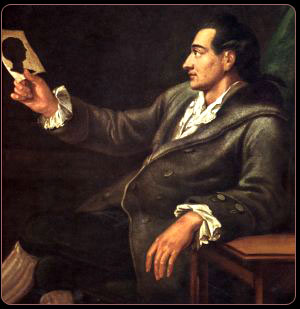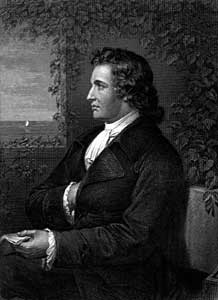Johann Wolfgang von Goethe, the boy poet

The following paragraphs are each excerpted in full from Autobiography, by Johann Wolfgang von Goethe (1749-1832), John Oxenford (1812-1877) translator. Each is lifted for the point Goethe makes about his being a child prodigy poet. Some of these relate important challenges to his poetic capabilites, challenges he met; but each paragraph should be easy for most any poet of relative maturity to relate to.
In his Autobiagraphy, after the period of these poetic challenges and incidents of his formative boyhood years, comes Goethe the young man, with a desire to write poetry for a beautiful woman. Here, though, we will be concerned with his boyhood only, when we find his father to be an important influence on him.
The titles to the paragraphs are mine, and are meant to both help the reader scan, and reflect the break such excerpts make to continuity. The pictures of Goethe in this post are far too old of him, to be reflective of his age as represented in the paragraphs, but the youngest I could find available for us.

Lame Poets Think Themselves the Best. Is My Poetry Lame?
We boys held a Sunday assembly where each of us was to produce original verses. And here I was struck by something strange, which long caused me uneasiness. My poems, whatever they might be, always seemed to me the best. But I soon remarked that my competitors, who brought forth very lame affairs, were in the same condition, and thought no less of themselves. Nay, what appeared yet more suspicious, a good lad (though in such matters altogether unskilful), whom I liked in other respects, but who had his rhymes made by his tutor, not only regarded these as the best, but was thoroughly persuaded they were his own, as he always maintained in our confidential intercourse. Now, as this illusion and error was obvious to me, the question one day forced itself upon me, whether I myself might not be in the same state, whether those poems were not really better than mine, and whether I might not justly appear to those boys as mad as they to me? This disturbed me much and long, for it was altogether impossible for me to find any external criterion of the truth: I even ceased from producing, until at length I was quieted by my own light temperament, and the feeling of my own powers, and lastly by a trial of skill,--started on the spur of the moment by our teachers and parents, who had noted our sport,--in which I came off well, and won general praise.
"My Father Held Rhyme as Indispensable"
The name of Klopstock had already produced a great effect upon us, even at a distance. In the outset, people wondered how so excellent a man could be so strangely named; but they soon got accustomed to this, and thought no more of the meaning of the syllables. In my father's library I had hitherto found only the earlier poets, especially those who in his day had gradually appeared and acquired fame. All these had written in rhyme, and my father held rhyme as indispensable in poetical works. Canitz, Hagedorn, Drollinger, Gellert Creuz, Haller, stood in a row, in handsome calf bindings: to these were added Neukirch's "Telemachus," Koppen's "Jerusalem Delivered," and other translations. I had from my childhood diligently perused the whole of these works, and committed portions of them to memory, whence I was often called upon to amuse the company. A vexatious era on the other hand opened upon my father, when, through Klopstock's "Messiah," verses, which seemed to him no verses, became an object of public admiration.[Footnote: The Messiah is written in hexameter verse.--Trans.] He had taken good care not to buy this book; but the friend of the family, Councillor Schneider, smuggled it in, and slipped it into the hands of my mother and her children.
Passion for French Theatre
After these confusions, disquietudes, and grievances, the former security and thoughtlessness soon returned, in which the young particularly live from day to day, if it be in any degree possible. My passion for the French theatre grew with every performance. I did not miss an evening; though on every occasion, when, after the play, I sat down with the family to supper,--often putting up with the remains,--I had to endure my father's constant reproaches, that theatres were useless, and would lead to nothing. In these cases I adduced all and every argument which is at hand for the apologists of the stage when they fall into a difficulty like mine. Vice in prosperity, and virtue in misfortune, are in the end set right by poetical justice. Those beautiful examples of misdeeds punished, "Miss Sarah Sampson," and "The Merchant of London," were very energetically cited on my part: but, on the other hand, I often came off worst when the "Fouberies de Scapin," and others of the sort, were in the bill; and I was forced to bear reproaches for the delight felt by the public in the deceits of intriguing servants, and the successful follies of prodigal young men. Neither party was convinced; but my father was very soon reconciled to the theatre when he saw that I advanced with incredible rapidity in the French language.
"Quietly Imitating Well-Known and Celebrated Authors"
When the work was done,--for, to my own astonishment, it really came to an end,--I reflected, that from former years many poems were extant, which did not even now appear to me utterly despicable, and which, if written together in the same size with "Joseph," would make a very neat quarto, to which the title "Miscellaneous Poems" might be given. I was pleased with this, as it gave me an opportunity of quietly imitating well-known and celebrated authors. I had composed a good number of so-called Anacreontic poems, which, on account of the convenience of the metre, and the lightness of the subject, flowed forth readily enough. But these I could not well take, as they were not in rhyme; and my desire before all things was to show my father something that would please him. So much the more, therefore, did the spiritual odes seem suitable, which I had very zealously attempted in imitation of the "Last Judgment" of Elias Schlegel. One of these, written to celebrate the descent of Christ into hell, received much applause from my parents and friends, and had the good fortune to please myself for some years afterwards. The so-called texts of the Sunday church-music, which were always to be had printed, I studied with diligence. They were, indeed, very weak; and I could well believe that my verses, of which I had composed many in the prescribed manner, were equally worthy of being set to music, and performed for the edification of the congregation. These, and many like them, I had for more than a year before copied with my own hand; because through this private exercise I was released from the copies of the writing-master. Now all were corrected and put in order, and no great persuasion was needed to have them neatly copied by the young man who was so fond of writing. I hastened with them to the book-binder: and when, very soon after, I handed the nice-looking volume to my father, he encouraged me with peculiar satisfaction to furnish a similar quarto every year; which he did with the greater conviction, as I had produced the whole in my spare moments alone.
"He Will Make You a Poem on the Spot."
After a short, insignificant conversation, my young comrade, who was but too well disposed towards me, could not suffer the matter to drop, without saying to the other, with some resentment, "Here is my friend who made those pretty verses, for which you will not give him credit!"--"He will certainly not take it amiss," answered the other; "for we do him an honor when we suppose that more learning is required to make such verses than one of his years can possess." I replied with something indifferent; but my friend continued, "It will not cost much labor to convince you. Give him any theme, and he will make you a poem on the spot." I assented; we were agreed; and the other asked me whether I would venture to compose a pretty love-letter in rhyme, which a modest young woman might be supposed to write to a young man, to declare her inclination. "Nothing is easier than that," I answered, "if I only had writing materials." He pulled out his pocket almanac, in which there were a great many blank leaves; and I sat down upon a bench to write. They walked about in the mean while, but always kept me in sight. I immediately brought the required situation before my mind, and thought how agreeable it must be if some pretty girl were really attached to me, and would reveal her sentiments to me, either in prose or verse. I therefore began my declaration with delight, and in a little while executed it in a flowing measure, between doggerel and madrigal, with the greatest possible /naiveté/, and in such a way that the sceptic was overcome with admiration, and my friend with delight. The request of the former to possess the poem I could the less refuse, as it was written in his almanac; and I liked to see the documentary evidence of my capabilities in his hands. He departed with many assurances of admiration and respect, and wished for nothing more than that we should often meet; so we settled soon to go together into the country.

0 Comments:
Post a Comment
<< Home